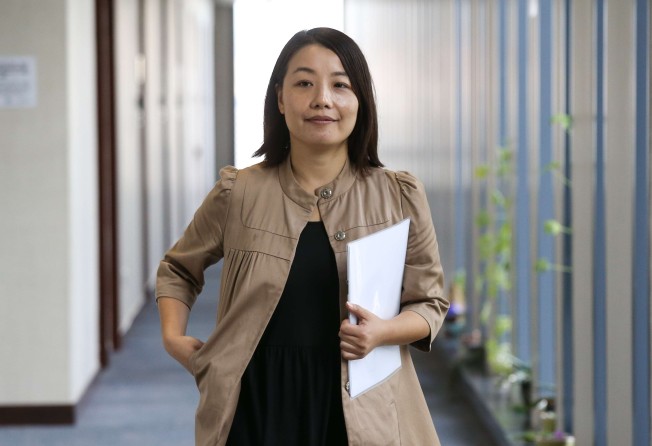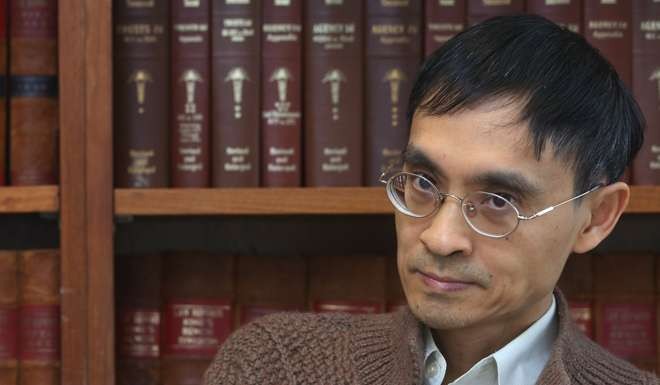Localist Lau Siu-lai calm despite possibility of more Legco disqualifications
Basic Law expert says High Court ruling puts question mark over others’ oaths

Lau Siu-lai has brushed off suggestions she could lose her seat in the Legco despite warnings that Tuesday’s disqualification of two former pro-independence lawmakers could pave the way for others.
Albert Chen Hung-yee, a constitutional law expert and member of the National People’s Congress Basic Law Committee, said Lau’s case could also be considered as a rejection to take the oath.
The High Court disqualified Youngspiration’s Sixtus Baggio Leung Chung-hang and Yau Wai-ching after they carried “Hong Kong is not China” banners and said what sounded like a derogatory word for “China” during their swearing-in on October 12.
During the same ceremony, Lau paused about six to eight seconds between each word as she took her oath and then wrote on her Facebook page that what she read was “unconnected individual words that did not carry any meaning”.
Lau is among the 13 localist and pan-democrat lawmakers who are now facing judicial reviews over the changes they made to their oath during last month’s swearing-in.
“Some cases [of judicial review of legislators] could be constituted as the rejection of oath-taking based on the standards set in [the case of Yau and Leung], such as Lau Siu-lai,” Chen said on an RTHK programme this morning.
As for other lawmakers, who have judicial reviews filed against them, Chen said it was unlikely they would be considered as rejecting the oath-taking based on the standards set by the Yau and Leung case. But if Beijing’s interpretation of the city’s mini-constitution was used in future rulings, the outcome for those legislators would become debatable, he said.
Chen said while the High Court’s findings on Tuesday were based on Hong Kong’s common laws, not Beijing’s interpretation of the Basic Law. The judge said the ruling would have been the same even if the interpretation was taken into consideration.

Despite being in line for a judicial review, Lau said she was not worried.
“A lot of residents are concerned about the direction of the pending judicial reviews and asked if I am worried about my seat or the seats of the camp advocating democratic self-determination,” she told reporters Wednesday on the sidelines of the Legislative Council’s weekly meeting.
“I want to tell them that now it is not just one or two seats being affected, the issue concerns our judicial system and whether there is still space to push forward our democratic movement. So I urge everyone to work together for our democratic movement.
“We are not worried about our seats and we will continue to advocate democratic self-determination for Hong Kong, and serve Hong Kong people on different platforms. We will not give up,” Lau said.
Lau said despite the judicial reviews, she had continued work as a lawmakers as usual.
“I have been working on several questions [for officials to explain policy issues], keeping contact with civic organisations, and pushing forward some plans on elderly care… I also hired several assistants to help me,” she said.
According to the Legco records, Lau received an advance of HK$500,000 for operating funds, entertainment and travel expenses, IT and set-up costs on October 12.
Asked if she regretted her Facebook comments, she said: “I have nothing to add.”
Eric Cheung Tat-ming, principal lecturer at the University of Hong Kong’s Faculty of Law, said Lau had a higher risk of losing her seat because her oath was rejected the first time she took it and her Facebook post made her case weaker.
Cheung said some undebatable points raised in Tuesday’s judicial review were that Leung and Yau did not meet the legal requirements for oath-taking, and their actions were considered a rejection of oath-taking.
The HKU lecturer said the reasoning in the case did not reflect Beijing’s interpretation of the Basic Law because the judge referenced the Basic Law and local laws only in his decision.
“Leung and Yau’s lawyers used some points from the interpretation documents to support their arguments, but the judge did not think their arguments were established,” he said.